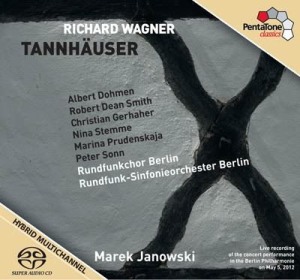Marek Janowski’s projected release of all of Wagner’s operas with the Berlin Radio Orchestra on Pentatone continues apace with this fine new Tannhäuser. As has been the case with the previous operas, Janowski and his players and singers are more interested in clarity, fine performances, and fleet tempos than in depth of characterization or interpretation. I found this an issue with Parsifal, Dutchman, and Tristan, but perhaps because I’m almost never genuinely moved by most of Tannhäuser, this concentration on matters musical rather than dramatic is less bothersome. And in fact, orchestrally—and sonically—this is ravishing: Pentatone has captured the flawless string playing, Wagner’s layered orchestration, and the luminance of the brass, allowing us to hear how well the orchestra plays. Special praise also should go to the chorus—for some reason, Janowski elicits more emotional elucidation from them than from his soloists.
Just for the record, he uses Wagner’s Vienna score (in contrast to Paris) but includes Walther’s song in the second-act contest (and it is very well sung by tenor Peter Sonn). Robert Dean Smith sings the quasi-impossible title role with apparent ease; this live recording, the booklet tells us, comes from one performance (May 5, 2012), and frankly, at the opera’s close, Smith sounds as if he could start all over again with little problem. Because he seems to be devoid of temperament, he sings without vulgarity and with unfailing musicality—and yes, I realize this is damning with faint praise, but it is rare to hear a stress-less reading of the role.
Smith’s voice is somewhat ordinary, with no real bite or ring at the top, but his diction is flawless and he phrases as Wagner wrote, with no need for nasty little snatches of breath. His Rome Narrative is good, but he makes almost nothing of the Pope’s words; here, a voice/artist like Wolfgang Windgassen or Peter Seiffert wins the dramatic day. In short, his performance is incredibly smooth; sadly, the “person” of Tannhäuser is not smooth at all. Smith sounds like a guy who somehow wound up at the Venusberg and can’t quite figure out what to do next.
Nina Stemme has almost too grand a sound for Elisabeth, but the voice is beautiful and in perfect shape and she gets to the character’s pure core and warmth. Marina Prudenskaya’s Venus is big and exciting, the voice round and firm. She is as literal as the others—there’s more room in Venus for cajoling and nuance than Janowski is interested in—but few will be disappointed. Christian Gerharer’s Wolfram is controversial—he occasionally oversings and overarticulates, sort of as if Fischer-Dieskau had wandered into Janowski’s concept and couldn’t be controlled. But the voice is a fine one and his third-act aria is suitably mellow and inward. Albert Dohmen’s Landgraf is strongly characterized, but I’d guess that singing Wotan has added the irregularities to his tone.
The recordings of choice remain Sinopoli’s odd-but-riveting reading on DG with Domingo (singing in very odd German), and Solti on Decca with a slightly strained René Kollo but an amazing Christa Ludwig as Venus. But this new one presents the score, as it were, as written, without a quirk or tic, and there’s something alluring about that.
































